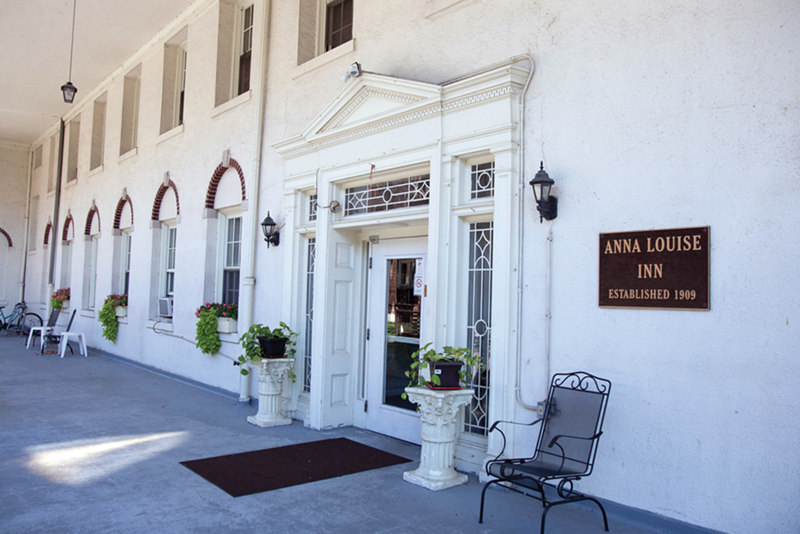W
hen founders of the Anna Louise Inn created the institution more than 100 years ago, chances are they never believed their choice of location would one day leave its owners and residents entangled in multiple lawsuits.
Last summer the facility’s owners rebuffed an offer from the powerful Western & Southern Financial Group to buy their property, triggering a heated legal battle. The company, located near the Anna Louise Inn in the affluent Lytle Park district on downtown’s eastern edge, wanted the site so it could demolish or redevelop the Inn and build upscale condominiums.
After the offer was rejected, the Anna Louise Inn continued with a long-planned renovation and was awarded a $2.7 million loan by Cincinnati City Council. That’s when Western & Southern filed a lawsuit against the Inn and the city, alleging zoning violations.
The showdown pits the Inn, opened in 1909 with the help of prominent attorney Charles P. Taft, against a company that ranks in the Fortune 500 and is headed by CEO John Barrett, an ex-chairman of the Cincinnati Business Committee who is widely considered one of the most powerful men in the city.
The facility’s owners and some city officials say Western & Southern is trying to use its sizable financial resources publicly, along with its political clout behind the scenes, to strong-arm opponents and get what it wants.
Western & Southern’s initial complaint went before the city’s Zoning Board of Appeals in mid-September, where it was rejected. Even before the board ruled, however, the company also filed a lawsuit against the Anna Louise Inn in Hamilton County Common Pleas Court; that case will be heard in December. Also, a group of Inn residents have counter-sued the company in federal court.
Owned and operated by nonprofit Cincinnati Union Bethel, the Inn provides low-income housing and social services for women in need.
In the case before the Zoning Board of Appeals in September, the city upheld its issuance of a Certificate of Appropriateness from the Historic Conservation Board, along with the awarding of tax credits for the renovation.
Larry Harris, the city’s urban conservator, says to obtain a building permit, the structure in question must comply with current zoning at the site as well as meet all health and safety regulations. Anna Louise Inn’s certificate was approved because the facility met all necessary criteria, he adds.
“The grant for zoning was basically not challenged, or least not required to do anything, because the building fit the zoning and the interpretation of the zoning code,” Harris says. “It’s not changing any of the (existing) uses for the property.”
Western & Southern disagrees. The company alleges the types of services provided there — which include “permanent supportive housing, social services programs, services for at-risk homeless women, recovery services for women previously engaged in the vice of prostitution and mental health services including on-site case management services” — violate Section 1411-05 of the city’s Land Use Regulations.
The section states that a structure must “maintain and enhance areas for residential developments that will complement and support the downtown core.”
But Steve MacConnell, Cincinnati Union Bethel’s president, counters that the facility has operated there for 102 years, providing the same types of services to women in need. The controversy began when Union Bethel received $10 million in Ohio tax credits and $2.7 million from the city of Cincinnati to renovate the property; both of the funding sources received their money through the U.S. Department of Housing and Urban Development.
The proposed renovation would change the Inn’s dormitory-style, shared living quarters to 85 individual units that include kitchens and baths. MacConnell says prior to the funding being granted, Union Bethel rejected an offer from Western & Southern to buy the property for $3 million.
After the funding was awarded, Western & Southern filed lawsuits against the Anna Louise Inn, Cincinnati Union Bethel and two employees from the city’s Zoning Department. MacConnell views the lawsuits as an intimidation tactic, designed to wear down Union Bethel financially and ultimately gain ownership of the building.
“The truth is that is our population of women at the Anna Louse Inn like where they live and Western & Southern wants the building and the land, even though we own it,” he says. “It’s the same as if I came to your home and said, ‘I’d like to have it please.’ ”
In jeopardy is the city’s award-winning Off the Streets program that helps prostitutes leave that lifestyle and find legal work.
MacConnell says Western & Southern is exhibiting a sense of entitlement
by saying, “We don’t want your kind in this neighborhood.” He questions the current behavior from a corporation that, in the past, has been helpful to the city and its social services.
Michael J. Laatsch, Western & Southern’s vice president of public relations and corporate communications, defends the company’s actions. The firm has long supported the mission of hundreds of social service agencies in Cincinnati, including with the Anna Louise Inn, he says.
Western & Southern’s reasons for proposing the Inn’s relocation are three-fold, Laatsch says: First, the tax credits needed for an alternate property would be about $6 million less than for the current location; secondly, selling the Inn to Western & Southern would provide cash reserves that would help the agency provide social services in the long-term; and, finally, redeveloping the property would provide needed tax revenue to a city with chronic budget shortfalls.
Western & Southern maintains it wants to work with the Inn, not dismantle it, and is willing create a multi-year transitional plan so clients and residents see no interruption in social services, Laatsch adds. The firm has offered Union Bethel either $3 million to purchase the property, or the greater of two independent appraisals.
“We recognize that not everybody agrees with us,” Laatsch says. “We don’t feel like we should be criticized for saying, ‘Here’s our point of view that we feel makes sense for the city and we’re prepared to back up our work with actions and resources to try to promote the best long term interest to the city.’ ”
Western & Southern will appeal the Board of Zoning Appeals’ recent decision before Common Pleas Judge Norbert Nadel at a Dec. 14 hearing. Laatsch says the litigation will buy time for Union Bethel to reconsider Western & Southern’s offer to relocate the facility.
Zoning attorney Tim Burke, who represents Union Bethel, describes the filings of multiple lawsuits as stalling tactics, adding that he believes the suits have no legal merit. Western & Southern ignored the administrative appeal process when filing their lawsuit specifically to go before Nadel, a Republican judge historically known for ruling in favor of Big Business, Burke says.
Burke adds that Western & Southern’s entire case hinges on one room designated for an office that provides social services to residents, a designation already approved under the category of transitional housing.
“They want to force Cincinnati Union Bethel out of what they believe is their neighborhood,” Burke says. “They have made it very clear in their complaint that, frankly, they don’t think the residents of the Anna Louise Inn are suitable occupants of their neighborhood — and they’ve come very close to saying it just like that in their complaint.”
For Anna Louise Inn resident Beverly Chapman, the property embroiled in controversy is simply her home. Four years ago, Chapman’s unemployment benefits from her former job as a tool and die maker expired, leaving her to face eviction from her residence.
Being a couple of years too young for Social Security, Chapman says her doctor’s recommendation to seek help from the Inn was a godsend because she had nowhere else to turn. At 64, Chapman says she’s not the typical resident, but there really are no typical residents, as the Inn houses retired IRS workers, women who served in the Iraq War and other women of all ages who have come in through various programs.
With a twinge of sadness, Chapman recounts how residents were so excited about the renovation and getting their own apartment, a project that’s now indefinitely on hold. Chapman, along with 15 others residents, are suing Western & Southern in federal court under the Fair Housing Act, citing discrimination.
The lawsuit itemizes some of the tactics used by Western & Southern, alleging the company is “vilifying the female residents of the Anna Louise Inn, photographing residents without their permission, falsely accusing residents of the Anna Louise Inn of engaging in criminal activity and other ‘inappropriate behavior’ in the neighborhood.”
Further, the lawsuit alleges Western & Southern has threatened to block charitable contributions to community organizations if the Anna Louise Inn remains at its present site.
Robert Newman, attorney for the plaintiffs, says, “The Anna Louise Inn has been in its only location in Lytle Park for 102 years and its residents do not want to move. They regard the Anna Louise Inn as their home. This is about protecting their rights.”
Chapman says Western & Southern is being a bully.
“I hope the word would get out just how unfair Western & Southern is being about this,” she says. “I don’t imagine they would like that to happen to their mother or aunt or sister. But they just act like we have no value at all, and it’s very upsetting.
“I think some of the other ladies here feel the same way I do,” Chapman adds. “If we didn’t have this, we wouldn’t have anything.”






